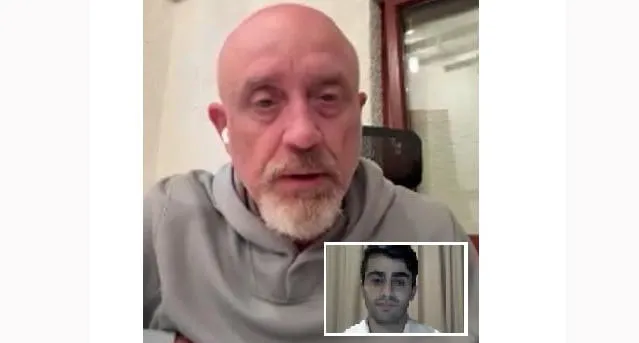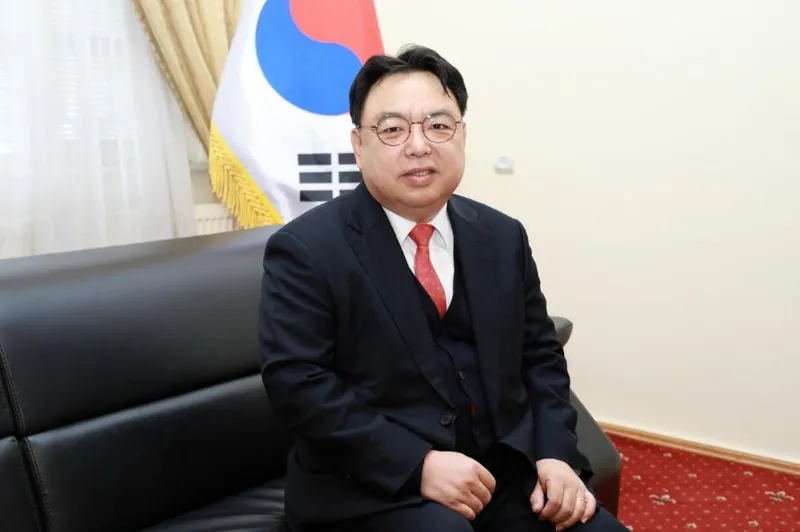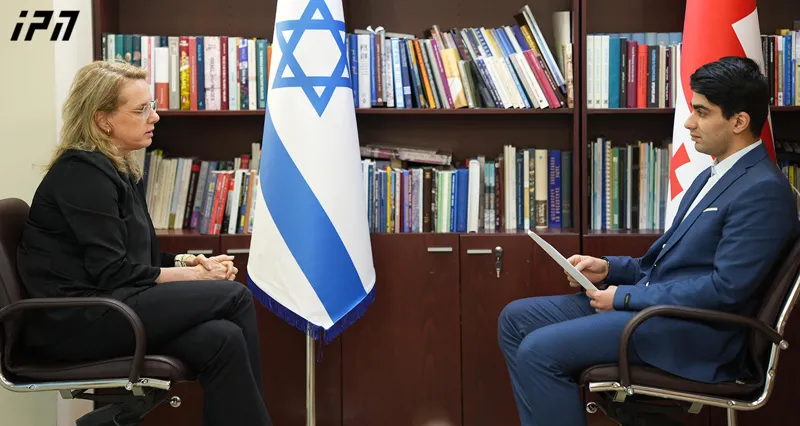Lithuanian Ambassador to Georgia Andrews Kalindra states that the law on "transparency of foreign influence" was completely unnecessary for the integration of Georgia into the European Union, and it has already affected EU-Georgia relations and partnership. The diplomat believes that even talking about establishing certain measures towards Georgia is very unpleasant for him both professionally and personally.
What is the perspective of Georgia as a candidate country for the European Union, how does he assess the fact of his being summoned to the Ministry of Foreign Affairs of Georgia and who is the "Global War Party" in reality? -Lithuanian Ambassador to Georgia Andrews Kalindra talked about these and other topics in an exclusive interview with Interpressnews.
On May 28, the Parliament of Georgia overcame the President's veto on the Law on "Transparency of Foreign Influence". Leaders of EU member states have repeatedly called on the ruling party to withdraw the law. How do you think the relations between Tbilisi and European capitals will develop now? What are the prospects and chances for Georgia now as an EU candidate country?
Just half a year ago, all of us have been very much happy and supporting the candidate status to be granted to Georgia. In December, we were enjoying it at Liberty Square. Now, we're entering another phase, phase of Georgia's EU approximation that goes to the next eventual step. This is the start of the accession talks. And this is a very serious step towards European Union integration. And we're talking about integration, about membership, not about something else. So that law, as you rightly said, so many European politicians have expressed their opinions about it. And if we weigh the opinions geographically and among the democracies and autocracies, we do see what the democratic countries have said and what the message was by autocratic regimes. The European Union itself is indeed a unique union that is based on values. We do see that this law was and is redundant for Georgia to go ahead with the European Union integration. It has already affected EU-Georgia relations and partnership. EU’s Foreign Affairs council already addressed the situation in Georgia in late May. In June the foreign affairs council will have another address. We wish Georgia to advance, but does Georgia wish to advance? It must prove this; it must be the champion of the champions on its European path.
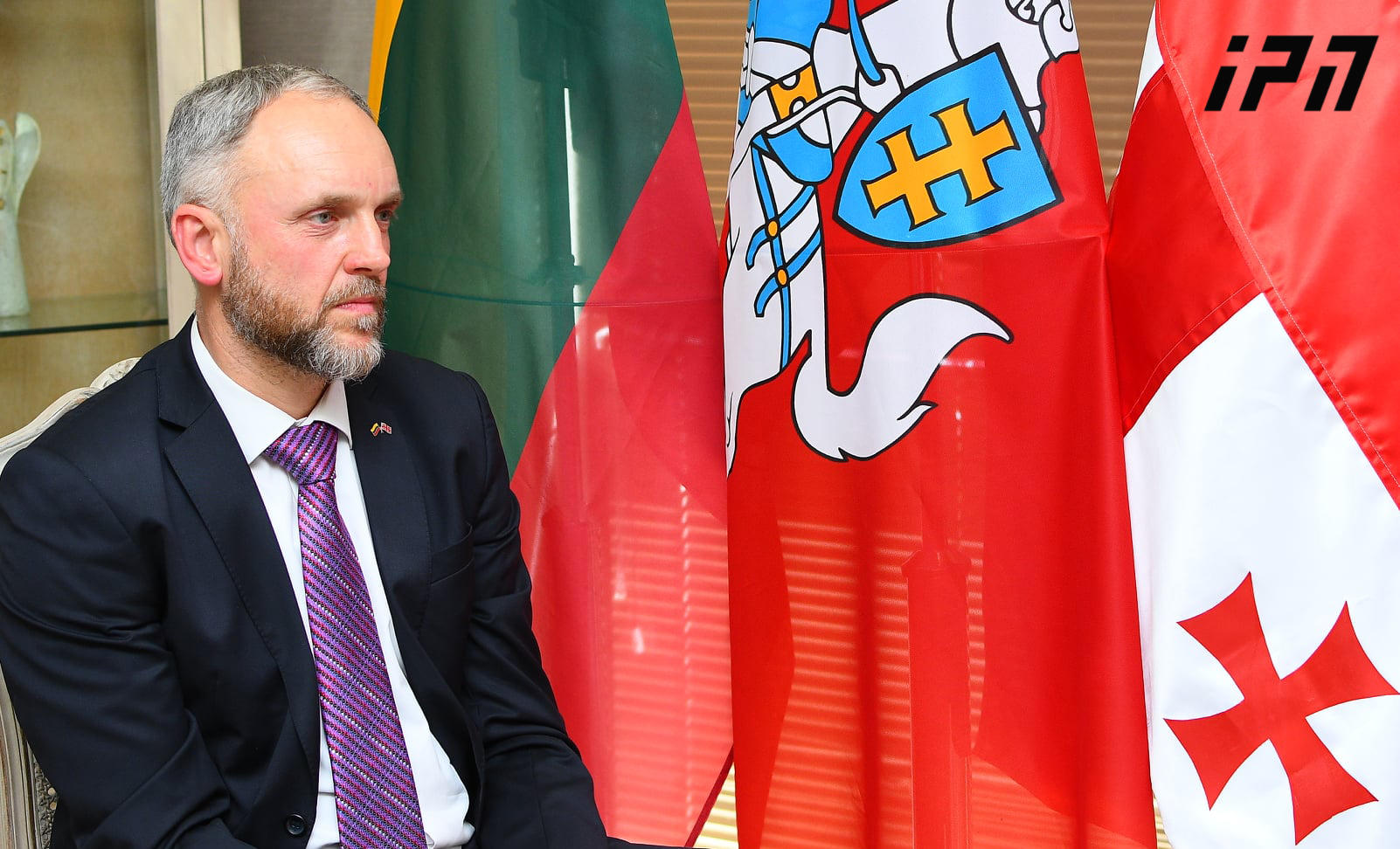
Before the adoption of the law, one of the main arguments of the ruling party was that some European countries are planning to adopt similar laws. They give the example of France, where they plan to adopt a new law on foreign interference. They also bring US Foreign Agents Registration Act (FARA) as an example. The authorities of Georgia say that they have not heard any legal arguments why this law should be in other countries and not in Georgia. What exactly was needed for this law to be considered compatible with European legislation and to become acceptable to the Western partners?
Yes, indeed, in the European Union, there is a discussion about eventual directive, and still these discussions are ongoing, but at the same time, it will not be at the expense of the freedoms and liberties. Everything what is taking place in the parliament of any country, this is not just a legal issue, that's also a political issue. That's why sometimes just to focus only on legal elements, maybe this is not the way how we do see the issue. The temperature in the air already since March 2023 has changed in Georgia. This is what we do hear from the political leaders, this is what we do hear from civil society, from the non-governmental organizations. Even our legally registered Lithuanians community in Georgia is about to start deregistration and stop the activities of that community here. Members of this community are not only Lithuanians, who just moved to enjoy Georgia and build up the future life in Georgia, but also the mixed families, because none of them wishes to be affiliated with something that is not very much clear or very much needed. So that's also about the safety, security, and perception of that initiative that has been tabled by the parliament and that has been approved by the parliament overriding veto. This is indeed the sovereign right by Georgia, the politicians and the people to decide on their own way. But in the European Union and in the countries which aspire to become member states, there are no purely internal issues. All issues within the EU candidate country have a bigger European interest. This is how we do operate, and this is how the system of checks and balance works.
Before the adoption of the Law on "Transparency of Foreign Influence", a number of European and American politicians said that in case of overcoming the veto of the president, some measures might be imposed on Georgia. There were discussions about suspending visa liberalization and financial assistance, as well as imposing sanctions on certain individuals. You represent one of the member states of the European Union; can you tell us when and what kind of regulations can be imposed to Georgia?
Lithuania, of course, has been a very long-standing friend of Georgia. It's very much professionally and personally unpleasant even to talk about these sanctions or any countermeasures against Georgia. Because Lithuania, all the time since the restoration of independence, has been supporting Georgia. Even in the program of my government, Georgia is mentioned four times as a country whose Euro-Atlantic aspirations we do support. The issue is being considered and will be discussed at the level of the ministers of Foreign Affairs of the EU. The decision-making process in the European Union is quite complex, where consensus is needed. But why I say this is, because I wish to emphasize this consensus culture; because if Georgia is about to join the European Union, this is also about the culture of consensus. Without consensus, nothing, or almost nothing moves in the European Union. Here, all the countries must assume responsibilities and commitments. Sometimes they need to step back for the European Union to be able to proceed. So, my reply is that - let's wait, let's assess, let's look. But it is very clear that this law is simply incompatible with Georgia's EU aspirations.
Recently, the foreign ministers of Lithuania, Estonia, Iceland and Latvia visited Georgia. On May 15, they joined the students' march and addressed the participants of the rally in front of the parliament. Among them was the Minister of Foreign Affairs of Lithuania, Gabrielius Landsbergis, whose speech was criticized by the Georgian authorities. According to them, the foreign minister, the diplomat, should not have made a speech at the rally. The Mayor of the capital Kakha Kaladze said: "This is an insult. All developed countries would act in such a way that they would take these foreign ministers by the hand and throw them out of the country." Can you tell us, was it a correct step of the foreign minister to address at the rally and also, how would you respond to the criticism of the government?
First, let me express appreciation for the Ministry of Foreign Affairs of Georgia, and their collaboration in organizing the visit of the four ministers, including all the meetings, including the high-level meetings starting with the President, continued with the Speaker, with the Prime Minister and Minister of Foreign Affairs. Secondly, let me just remind you that in August of 2008, the Lithuanian President, alongside the Latvian, Estonian, Polish and Ukrainian Presidents, came to Georgia to extend a hand of support, while the Russian military contingent was still in Georgia’s territory. The ministers who visited Tbilisi freed up their schedules to devote 24 hours to Georgia. They care about Georgia and about its future; and Ministers chose to meet and stand in front of the people who are supporting the future of Georgia within the European Union. This coincides with our foreign policy priorities and the constitution of Georgia, which the EU aspiration is part of. The ministers had very open and frank discussions. This is how we do perceive diplomacy. At the same time, we should not hide that there is the part of population that may think a bit differently and another part of population that maybe is even pushing harder for the government to go to this direction of Georgia’s EU integration. So, I would appreciate that Georgian people would take this visit as a very friendly step, as well as a very serious signal for Georgia's people and for the government of Georgia. And also, that the outcome of everything that has been done and decided in Georgia, will have an effect on Georgia's EU aspiration, especially when we are on the edge of talking about Georgia starting its EU accession negotiations. We went through that process say, twenty-five years ago. We knew that once again we had to be the champions among champions to prove to the EU member states that we were ready to be accepted into the European Union. This is what we wish to share.
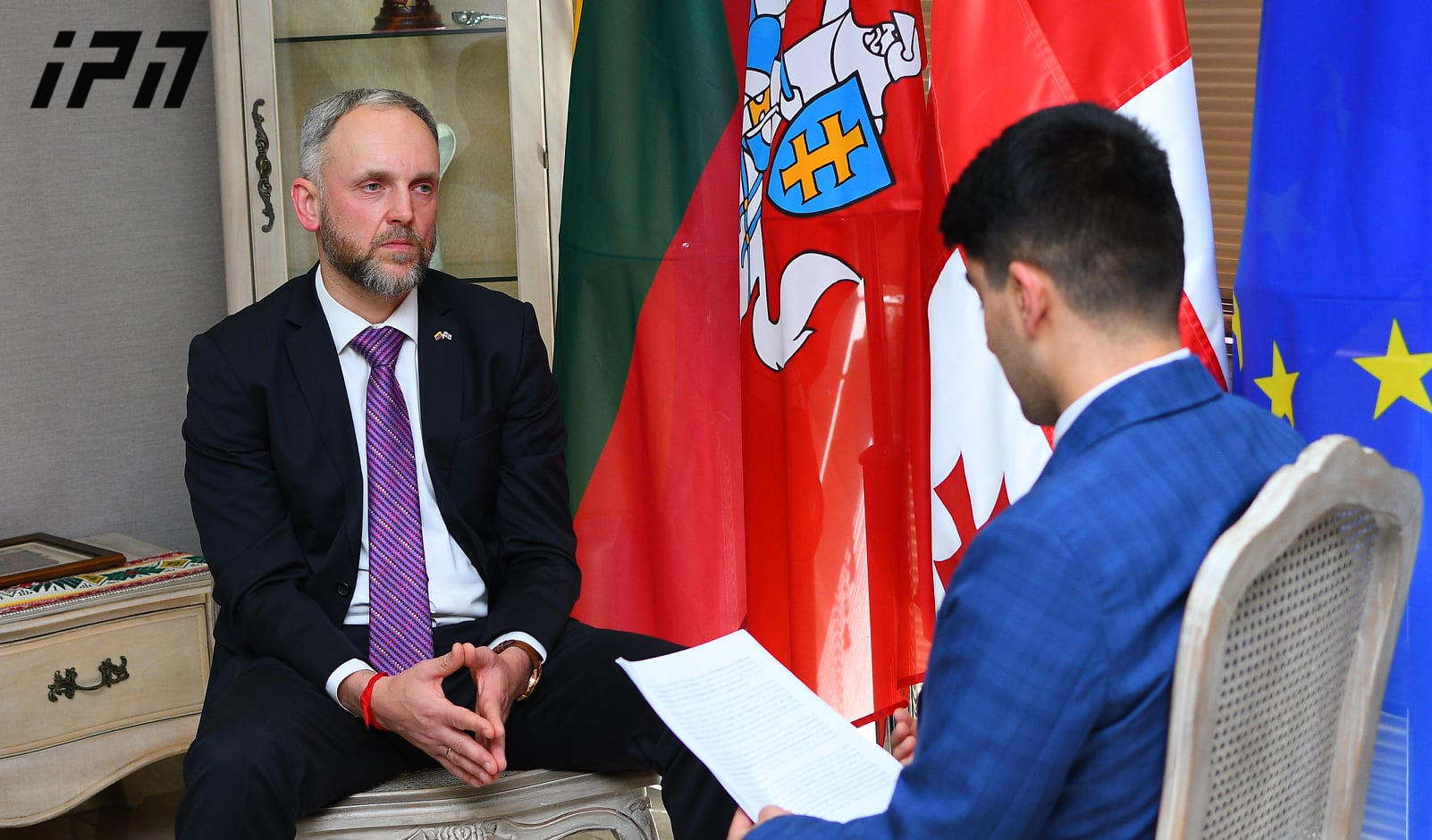
To answer the question about criticism. There are free people in a free country. They have a right to different opinions. And this is how democracy works.
You were summoned to the Ministry of Foreign Affairs of Georgia on May 31. According to the Ministry, ""The Georgian side explained to the Ambassador that the recent statements made by Lithuanian officials, as well as the participation of the Lithuanian Foreign Minister in the protest, as well as the summoning of the Georgian Ambassador to the Lithuanian Foreign Ministry due to the adoption of the transparency law, represent gross interference in the country's internal affairs and are not compatible with the traditionally existing friendly and partnership relations between the two countries”. How do you evaluate your summons to the Ministry of Foreign Affairs of Georgia, and on the other hand, what did official Vilnius have to say to the Georgian ambassador to Lithuania...
First, I do take every meeting at the Ministry of Foreign Affairs of Georgia as the one to be dedicated just to discuss how we could move our relations forward. This year, in 2024 we are commemorating and celebrating the 30 years of the restoration of our diplomatic relations. Both our countries have planned a set of cultural events in Georgia and Lithuania. We are very happy with how close the people of our two countries are.
Yes. This meeting was one of the biggest on the agenda. We have discussed and exchanged opinions about the current developments. But once again, our mandate as diplomats is through discussions to find the way of bringing our countries even closer. I would not say in diplomatic terms that the meeting was very ordinary. Summoning of the ambassador has a certain temperature, I would say, and a certain diplomatic psychology. But still, I'm confident that this will not negatively affect the relations which we stand for.
Police Day was celebrated in Georgia on May 31. As it is known, none of the ambassadors of the USA and EU countries came to the dedicated event. At the same time, the embassies sent representatives to the event. As the Minister of Internal Affairs, Vakhtang Gomelauri, said, "Some were busy, some were not well, some had a cold." Can you tell us the reason for your absence , was it a form of protest on your part against the government?
In our professional life here, there is a huge set of different kinds of invitations. We appreciate that we, as a diplomatic corps, are being invited to express support. So, this issue of appearance or not appearance, I would not just put it in as black or white. Definitely, the police day in different countries is being celebrated or commemorated in a different way. but at the same time, on my behalf, there are not any kind of excuses or compromises when it comes to events dedicated to the day of independence, or of restoration of independence, or the day which is one of the main days of Georgia. We did have, on that same day, other meetings that afterwards we had to work on, as part of a mandate also to report on the developments in the country. Usually, we use common sense in such cases.
In general, how can the recent foreign policy of Georgia be evaluated? Other issues are added to the processes we have already discussed, including the implementation of visa-free travel between China and Georgia. In addition, Georgia handed over 49% share of the Anaklia deep-water port strategic project to the Chinese state consortium. To what extent do you share the already widespread assessment that Georgia's main foreign partners, Washington and Brussels, are being "replaced" by Beijing?
In Lithuania we have the so-called law on the strategy of the investments that limits the entry of the non-EU, non-NATO, non-OECD countries into the strategic sectors of our economy. That includes port infrastructure, energy, telecommunications, banking system and other strategic sectors. That's why we do not have such dilemmas on our own soil, because all the strategic sectors and the main infrastructure projects are open for the companies that originate from the EU or NATO or the OECD. So, there is a sovereign right for Georgia to choose a partner in such a high scale infrastructure project. Does it have political elements? Every step by every government in every country has a political element and has a signal. And this is how we treat this large-scale project also. But still, I would not say that investors from the West have been replaced by investors from other countries. This is about how Georgian institutions and the government, see the future of the projects that are very important for Georgia. Also, definitely the connectivity to the EU, as well as the Black Sea connectivity is very important. We're interested in Georgia's infrastructure that is directed towards the trade with the EU member states. I would add that once a huge Chinese company showed interest in our seaport of Klaipėda. After consideration, we concluded that this port had to be affiliated to only the countries and the companies that originated from the Euro-Atlantic sphere.

The top officials of the Georgian government say that Georgia is tired of waiting at the door of the European Union and NATO - "We have been standing in a draught (two-way wind) for 20 years" - this is the statement that we hear from the government. Do you think it was and is necessary for the West to take more timely and effective steps to bring Georgia closer to you?
I would understand that fear and perception, if we were to talk about this in 2020 or 2021; However, since that time, within four years, there is a huge transformation in the attitude towards the EU enlargement in the European Union capitals. As never before, three countries have been advanced: Ukraine, Georgia and Moldova, on this EU path with the EU candidate status. There is even consensus about the eventual next stage of the EU enlargement in 2030. What does it mean 2030? That means that by 2028, all the accession talks and negotiations must be concluded. And 2028, having in mind where we are right now, it's like the day after tomorrow. Lithuania knows this as we ourselves went through this process. EU accession talks are very complex, very deep-rooted work by institutions on every sector among the 35 chapters, including but not limited to environmental, social-economic, healthcare, social care, and many other issues. The acceding country negotiates with the European Union, and it either takes recommendations on board, or if they cannot afford to do that at that time, they negotiate about the extension of periods of application of one or another rule. In five-six years there will hopefully already be the next phase of EU enlargement. This is not the amount of time that we could call forever. We wish Georgia to be on that same EU enlargement train that goes very fast.
Be and stay ready. All the doors and windows for the EU integration are being opened. Will they be open forever? I don't know. I'm not sure. And I'm saying that very responsibly. That's why we're still extending that hand of invitation to work together through the accession talks for the EU membership. Even before the war against Ukraine, we had been advocating for decades for Georgia to be part of the European Union. Now we advocate for Georgia to undertake the necessary steps and to simply be a reliable partner on this joint path.
On October 26 Parliamentary elections will be held in Georgia. There has been a difficult political situation in the country for years, where the main pre-election messages of the parties are mainly limited to criticizing their opponents. What do you think should be done in the country in order to process the elections in a peaceful and democratic environment? What are your advices to the representatives of the government and the opposition parties of Georgia.
We all individually and collectively are responsible for the future of our country. I would humbly say that I would appreciate more focus on the future, more focus on the policies, on the frameworks, how the country is going to look like, and where it's going to be placed in the future. It is important to express the opinion by vote, that is to vote for, not against something. I would encourage just to build up that positive agenda of politics, because without politics, nothing happens. When we have quite a tense exchange of political ideas, this is also a sign of democracy, because in the neighborhood of yours, in the neighborhood of mine, we don't see such a level of liberties and freedoms where we discuss the political issues.
The Georgian authorities expect that after the European Parliament elections this year, when the structure will be re-staffed, they will have better relations with the EU structures, and they will have more friends among them than it is today. What are your expectations, how realistic is the expectation of the Georgian government that they will be able to improve relations with European partners after the European Parliament elections are held.
I think that is one of the philosophical questions. Sometimes, in order just to have good relations, we need to behave accordingly in the now, while not waiting that something might change on another part of the street, would it be Georgia, Lithuania or the European Union. We elected members of Parliament. This is the expression and mirroring opinions of the society, of the people, of what would be Georgia, Lithuania or European Union. I would wish that in the future elections for the European Parliament, in 2034, you, as a Georgian citizen, would be eligible to vote and to elect your representatives to the European Parliament and to bring your input into the European ideas, how Europe should move up. It's good that we're focusing on how to make these relations much better, but this should not be at the cost of unnecessary action or non-action.
I want to ask you about the ongoing war of Ukraine. More than 2 years have passed since the Russian unprovoked attack. Unfortunately, Ukraine has not yet been able to return the lost territories. Ukrainian President Volodymyr Zelenskyy has pointed out many times that the US and EU military aid is not enough, and more powerful weapons are needed to succeed. How would you assess the current situation in Ukraine, and is there a "fatigue" of war in EU countries?
Our generation faces unprecedented geopolitical situation alongside conventional military attacks against Ukraine. We had to change our mindset, that this may indeed happen in the 21st century. As a Lithuanian, we had a very sad experience with Russia's imperialistic approach, especially towards their neighbors and towards those who think differently. That's why when it comes to Georgia as well, we must safeguard liberties, freedoms and democratic credentials. Because there is one big issue between the autocracies and democracies. Democracies do not start wars. Autocracies tend to use these unconventional methods as a tool to achieve goals of their own imagined international relations. I'm proud that people of Lithuania and the government of Lithuania are still doing the most we can. We are among the top three countries on the globe in terms of the share of the GDP that has been directly given to support the Ukrainians’ resistance against the aggressor. And a future of Ukraine, is very much important to each and everyone, including for smaller countries like Georgia and then Lithuania.
While I'm meeting students in universities and the youth, I do understand that we are in a different country under a different security umbrella. But my plea to each Georgian is, please do whatever you can to support Ukraine. Sometimes it's important to share moral and psychological support, to make a phone call to friends in Ukraine and express solidarity. We're responsible for how the European continent is going to look like in the future. We wish Ukraine just to be victorious. Our hearts and souls go all the way around with Ukraine.
I would also like to comment about Global War Party. It is a year or two years since we have a newly calibrated definition of a global war party in public opinion. In our sense and what Minister Landsbergis said while he was here in Georgia on 15th of May, is that the only global war party is in the Kremlin and everyone, including within that country and the allies of the Kremlin are part of that war party.
So, this is the big distinction between the Euro-Atlantic democratic community and those who are just now pushing and insisting on military solutions for their own initiatives that are not necessary at all. So, the global war party and the headquarters of that party are in the Kremlin. All of us must tackle it.
Thanks you, that was my final question, you can address Georgian society or make any comment
I will use this opportunity and congratulate Georgia on qualification to Euro 2024 football championship. Sport matters very much, especially for smaller countries. I wish Georgia including through the sports, to be very, very close to the membership of the European Union.
Beka Beriashvili




